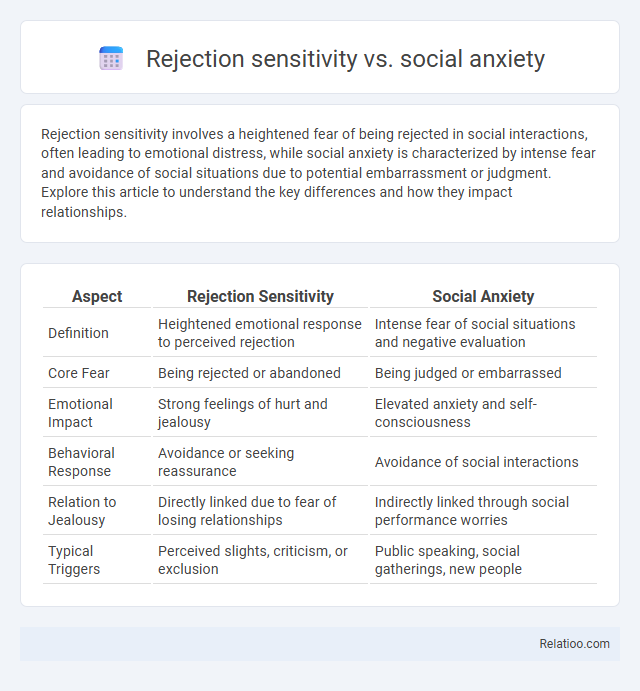Rejection sensitivity involves a heightened fear of being rejected in social interactions, often leading to emotional distress, while social anxiety is characterized by intense fear and avoidance of social situations due to potential embarrassment or judgment. Explore this article to understand the key differences and how they impact relationships.
Table of Comparison
| Aspect | Rejection Sensitivity | Social Anxiety |
|---|---|---|
| Definition | Heightened emotional response to perceived rejection | Intense fear of social situations and negative evaluation |
| Core Fear | Being rejected or abandoned | Being judged or embarrassed |
| Emotional Impact | Strong feelings of hurt and jealousy | Elevated anxiety and self-consciousness |
| Behavioral Response | Avoidance or seeking reassurance | Avoidance of social interactions |
| Relation to Jealousy | Directly linked due to fear of losing relationships | Indirectly linked through social performance worries |
| Typical Triggers | Perceived slights, criticism, or exclusion | Public speaking, social gatherings, new people |
Understanding Rejection Sensitivity
Rejection sensitivity involves an acute emotional response to perceived or actual social rejection, often leading to heightened vigilance and anticipatory anxiety. Unlike social anxiety, which centers broadly on fear of social situations and judgment, rejection sensitivity specifically focuses on the fear of being rejected or abandoned by others. Understanding your rejection sensitivity can help differentiate it from social anxiety and guide more targeted coping strategies for managing interpersonal relationships.
Defining Social Anxiety
Social anxiety is characterized by an intense fear of social situations driven by concerns about being judged or negatively evaluated by others. Unlike rejection sensitivity, which specifically involves heightened sensitivity to perceived or actual rejection, social anxiety encompasses broader fears such as embarrassment and humiliation in various social interactions. Understanding the distinction between social anxiety and rejection sensitivity is crucial for accurate diagnosis and targeted therapy approaches.
Key Differences Between Rejection Sensitivity and Social Anxiety
Rejection sensitivity involves heightened emotional reactions to perceived or actual rejection, often leading to anticipation of negative evaluation, while social anxiety centers on intense fear and avoidance of social situations due to concerns about embarrassment or judgment. Key differences include that rejection sensitivity specifically triggers strong responses to rejection cues, whereas social anxiety encompasses broader social fears and avoidance behaviors. Neurobiologically, rejection sensitivity is linked to heightened amygdala activation in response to social threats, whereas social anxiety involves a wider network including the prefrontal cortex, reflecting regulatory deficits.
Common Symptoms and Behavioral Patterns
Rejection sensitivity and social anxiety both involve heightened fear of negative evaluation, but rejection sensitivity specifically centers on emotional overreaction to perceived or actual rejection, leading to intense feelings of hurt, anger, or sadness. Common symptoms of rejection sensitivity include hypersensitivity to criticism, avoidance of social situations that risk rejection, and frequent rumination on perceived slights, while social anxiety often presents with physical symptoms like sweating, trembling, and rapid heartbeat during social interactions. Your behavioral patterns may show overlap in avoidance and withdrawal, but rejection sensitivity can drive aggressive or defensive responses where social anxiety primarily results in inhibition and fear-driven escape behaviors.
Underlying Causes and Risk Factors
Rejection sensitivity primarily stems from past experiences of rejection or criticism, often linked to childhood emotional neglect or trauma, shaping an individual's fear of negative evaluation. Social anxiety is driven by an intense fear of social situations due to concerns about being judged, rooted in genetic predispositions, temperament, and adverse social experiences. Your vulnerability increases when these overlapping risk factors, such as low self-esteem and heightened emotional reactivity, combine, intensifying both rejection sensitivity and social anxiety symptoms.
Impact on Relationships and Daily Life
Rejection sensitivity amplifies emotional responses to perceived social slights, causing heightened fear of abandonment that strains Your relationships by fostering mistrust and withdrawal. Social anxiety manifests as pervasive fear of social situations and judgment, leading to avoidance behaviors that limit social interactions and opportunities for meaningful connections. Both conditions disrupt daily life by impairing communication and increasing stress, though rejection sensitivity centers on fear of rejection while social anxiety involves broader social fear.
Coping Strategies for Rejection Sensitivity
Coping strategies for rejection sensitivity involve cognitive reframing techniques, such as challenging negative beliefs about oneself and interpreting ambiguous social cues more realistically, which can reduce emotional distress. Mindfulness practices and emotional regulation skills help individuals manage intense reactions by fostering present-moment awareness and lowering physiological arousal. Building strong social support networks and seeking therapy, especially cognitive-behavioral therapy (CBT), are effective methods for improving resilience and decreasing hypersensitivity to perceived rejection.
Managing and Treating Social Anxiety
Social anxiety and rejection sensitivity often overlap, but managing social anxiety requires targeted strategies such as cognitive-behavioral therapy (CBT), exposure therapy, and mindfulness techniques to help You reduce fear of judgment and improve social interactions. Rejection sensitivity primarily involves heightened emotional responses to perceived rejection, which can exacerbate social anxiety symptoms, making it essential to address both through counseling and skill-building exercises. Effective treatment emphasizes developing coping mechanisms, building resilience, and gradually increasing social exposure to diminish avoidance behaviors and improve overall confidence.
When to Seek Professional Help
When rejection sensitivity severely disrupts your daily interactions or intensifies social anxiety symptoms, it is crucial to seek professional help. Persistent fear of rejection combined with avoidance behaviors can indicate underlying social anxiety disorder that requires targeted therapeutic intervention. Your mental health provider can offer strategies such as cognitive-behavioral therapy (CBT) to manage emotional responses and improve social functioning effectively.
Building Resilience and Improving Social Confidence
Rejection sensitivity involves an intense fear of rejection that can amplify social anxiety symptoms, leading to avoidance behaviors and impaired social interactions. Developing resilience through cognitive-behavioral techniques helps individuals challenge negative thought patterns, fostering emotional regulation and reducing hypersensitivity to rejection cues. Improving social confidence requires consistent exposure to social situations, skill-building in communication, and practicing mindfulness to enhance self-awareness and diminish fears associated with social evaluation.

Infographic: Rejection sensitivity vs social anxiety
 relatioo.com
relatioo.com